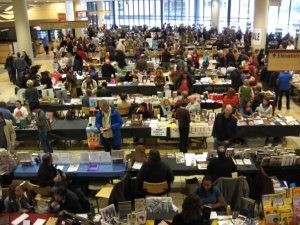This year is going to see a lot of commemorations of momentous events from 1965. The marches from Selma to Montgomery and the Voting Rights Act (recently depicted in the movie Selma), the establishment of Medicare, the assassination of Malcom X, and the completion of Eero Saarinen’s Gateway Arch in St. Louis are just a few.
One event I’m particularly interested in is the establishment of the National Endowment for the Arts. Historian Donna Binkiewicz, in Federalizing The Muse: United States Arts Policy & The National Endowment for the Arts 1965-1980 provides a really useful history of the foundations’ birth. In early 1965, legislation creating The National Endowment for the Arts and The National Foundation for the Humanities was introduced in both the House and Senate on the opening day of the second session of the 89th Congress. Various advisers to President Johnson, including Senator Pell, believed that the joint foundation legislation would have a better chance at passing than the arts bill would alone.
Over the coming months, various drafts and versions of the arts and humanities legislation would be introduced. LBJ watched the proceedings closely and submitted his own version of the bills, including an idea circulated in the Kennedy administration’s draft legislation for a national arts program: the requirement that the federal funds given out for arts projects be matched equally with private sector funds. On Sept. 29, 1965, LBJ signed the act creating the National Endowment on the Arts and the Humanities into law (Binkiewicz, 79-89). Here’s a link to that legislation. Over the next 50 years, less money would go to individual artists and more NEA money would go to state arts boards and agencies who often awarded matching grants.
The NEH has already started commemorating its 50th birthday, and the NEA chair has also announced a collaboration with the National Parks Service (which will soon celebrate its 100th anniversary) for ART WORKS, a funding partnership that will award proposals for art works that “engage communities” and capture the “thrilling landscapes” and amazing stories that inspired the national parks.
I imagine that we’ll see and hear a great deal over the coming months that unreservedly celebrates the 50th anniversary of the founding of the NEA, and, as a weird kind of commemoration, we will probably see the predictable conservative attacks on it. We’ve seen plenty of attacks on the NEA over the years from the right (here is one of the latest), but the history of arts funding in the U.S. demonstrates that not all critiques of federal (and private) arts funding come from the right. Many come from the political and artistic left. Steve Evans, writing in The Baffler in 2006, criticized NEA chair Dana Gioia (2003-2009) for dodging questions about many American poets’ anti-war sentiments and for being defensive about his silence on the Bush administration’s war plans. Here, in Nathanial Tarn’s book review of Eliot Weinberger’s Oranges and Peanuts for Sale (2009), is Weinberger saying that the NEA has shut artists up “by buying them off.”
This is a good time for those of us interested in poetry communities, organizations, and institutions to think about the politics of funding. We need to think about how poets, who consider ourselves part of communities, who organize events or workshops within or on behalf of these organizations, or who help them run, talk about money. Specifically, how do organizations/communities need to express discourses which make them accountable (or at least make them sound accountable) to funders? How does this discourse sometimes come into conflict with other discourses the community espouses and uses to express its identity?
I think that that moment–when those discourses contradict each other–is when the arguments happen. Identities (expressed through discourses) begin to clash. According to Binkiewicz, part of President Nixon’s rationale for repeatedly doubling the NEA budget was to “appease or control discordant groups” (Binkiewicz, 147-149), so when 1970s poetry communities who identified as countercultural applied for and received NEA money, did that mean that they capitulated to Nixon? Could they still be countercultural if they used federal money to survive? Were they “bought off”?
It isn’t just federal money that creates identity problems. According to Chin-tao Wu, in her book Privatising Culture: Corporate Art Intervention Since the 1980s, the tax codes established in the 1970s doubly reward corporate arts funding. They are not only provided with tax write-offs, but the codes help them successfully turn “art museums and galleries into their own public relations vehicles” (Wu, 2). These rewards got more and more lucrative from the 1980s onward.
Some poetry communities embrace countercultural discourses that reject mainstream capitalist behavior. But if they apply for and receive grants from private or corporate foundations, is their identity compromised? Joseph Galaskiewicz, in Social Organization of an Urban Grants Economy: A Study of Business Philanthropy and Nonprofit Organizations, his study of corporate giving in the Twin Cities from 1979 to 1981, raises this very question: “non-profits (who ask for money) must manipulate the referents of legitimacy. One of these is the organizational goals that reflect the values of the dominant society” (Galaskiewicz, 147). In other words, poetry organizations who find a way to “manipulate the referents of legitimacy,” to speak in a discourse amenable to funding sources, do so at the risk of de-emphasizing other discourses that contribute to their identity in the first place.
Those of us who consider ourselves part of poetry communities/organizations need not only to think about these questions; we need to talk about them with each other. If we don’t, our arguments and conflicts about who we are and want to be won’t go away. They will likely erupt in ugly fashion.







